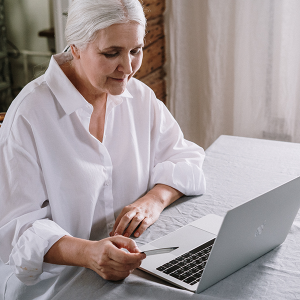What was the Digital Access Project?
The project aimed to train elderly people on developing digital skills and, specifically, the digital skills needed to access public services online, and thus to better adapt to a digital oriented world and to improve their quality of life – offering the elderly an increasingly autonomous, healthy and enjoyable retirement. Essentially, the project aimed to develop the digital skills of elders, not just by teaching a passive use of digital devices, but to ensure older people can easily identify and access the right services and support, take advantage of internet services, and feel confident using online tools to manage their health and life quality. Although by nature the elderly tend to be the most resistant to innovation and change, given the increasing focus on active ageing and the growing life expectancy of European citizens, it is becoming more evident that elders cannot be exempt from the digital revolution. According to Eurostat, a “grandparent boom” is approaching and by 2060 one in three Europeans will be over 65 years old. This is therefore a critical area of focus.
What lessons from the project were drawn in terms of the UK Industrial Strategy?
We developed the project focus for the UK Government’s policy paper on “Digital skills and inclusion”, published on 1st March 2017, which defines the key barriers affecting individuals as follows:
- Access: the ability to connect to the internet and go online
- Skills: the ability to use the internet and online services
- Confidence: a fear of crime, lack of trust or not knowing where to start online
- Motivation: understanding why using the internet is relevant and helpful.
The project provides tailored solutions for overcoming these barriers by:
- giving older people the digital skills that they need;
- applying confidence building approaches by developing virtual assistance based on elder people’s real-life scenarios; and
- using interactivity as part of the learning process in meaningful ways to provide opportunities to “learn through doing” and in doing so promote understanding and motivation.
One of the most important lessons was to ensure our digital media was easy to use and safe to reassure people, especially the elderly, to get over those barriers that were stopping them going online.
We also need to remember that we need to motivate the elderly to use digital media – we need to ensure they see it as relevant to their lives and that it is something they need to care about. We are bringing digital into people’s lives in a way that benefits them; helping them to learn, use and keep in contact with others – making them realise that they can do things they care about online in a safe and easy manner.
How has COVID-19 changed the challenges facing healthy ageing in your view?
The impact has obvious physical challenges but in addition we feel the issues of the ‘lockdown’ for the elderly have included:
- Increased mental health or wellbeing concerns
- Increased loneliness and isolation
- Lack of safe spaces such as access to day centres etc.
- Challenging family relationships
- Lack of trusted relationships or someone to turn to
- Increased social media or online pressure
These challenges obviously call for a wide cross section of research and development activities, and in terms of social sciences developing a better understanding of human behaviour and nature would allow social innovation to be founded in robust and comprehensive research which is likely to enhance the impact of any possible solutions. The COVID crisis, with the proliferation of misinformation, points to a need to explore how to address ‘fake news’ and how to ensure that people who are required to isolate may be affected. For the older members of our communities the impact and consequences of lockdowns and other restrictions are likely to have very serious outcomes and place further demands on public health and community-based health services.
Do your see opportunities for commercialisation/social enterprise-based solutions for these challenges?
Taking a positive out of COVID-19 has been the realisation amongst many sectors of business and community that a lot of their work and day to day living needs can be delivered online.
There is a great opportunity therefore to provide a targeted suite of digital tools for the elderly ranging from online banking to cloud computing to virtual reality. This requires first-class digital infrastructure and an advanced skills base. Everyone, including the elderly, should have the skills and confidence to seize the opportunities of digital technology and have easy access to high-quality internet wherever they live, work, travel or learn.
It is also an opportunity to close the digital divide between the elderly and the rest of the population – ensuring that everyone is able to access and use the digital services that could help them manage their lives, progress at work, improve their health and wellbeing, and connect to friends and family.
Recognising that many of the solutions will have to be digitally based calls for social science researchers to address issues such as human computer interface, the impact of online activities on mental health, etc. Those of us working in the third sector and trying to develop solutions will benefit from wider engagement with social scientists who have a deeper understanding of human behaviours to ensure that social innovation is informed by global best practice.
Creating a focus on social science is valuable however, given the nature of the present crisis and its impact on communities and people, a multi-disciplinary paradigm needs to become characteristic of the discourse between social innovators and the wider research community.
Image credit: cottonbro from Pexels




